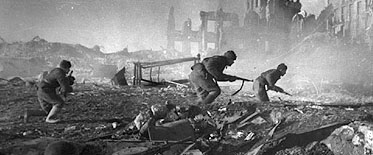ADVERTISEMENT
|
|
|
Russia Travel & Tourism Guide
Russia History - Soviet Russia
NextGen Day offers travel tips and information for top travel places and best destinations in Africa, Asia, Australia, Europe, Middle East and United States of America. We feature Africa links, Africa resources and large selection of Africa budget airlines, Africa chartered planes, Africa sea cruises, Africa ferries, Africa travel agencies, Africa land transports and Africa attractions including Africa beaches, Africa medical tourism, Africa retirement homes, Africa historical and Africa pilgrimage tours.

Stalingrad, 1942. The vast majority of the fighting in World War II took place on the Eastern Front.
Nazi Germany suffered 80% to 93% of all casualties there
Following the October Revolution, a civil war broke out between the new regime and the Socialist Revolutionaries, Mensheviks, and the White movement. The Treaty of Brest-Litovsk concluded hostilities with the Central Powers in World War I. Russia lost its Ukrainian, Polish and Baltic territories, and Finland by signing the treaty. The Allied powers launched a military intervention in support of anti-Communist forces and both the Bolsheviks and White movement carried out campaigns of deportations and executions against each other, known respectively as the Red Terror and White Terror. The famine of 1921 claimed 5 million victims. By the end of the Russian Civil War, some 20 million had died and the Russian economy and infrastructure were completely devastated. Following victory in the Civil War, the Russian SFSR together with three other Soviet republics formed the Soviet Union on 30 December 1922. Out of the 15 republics that constituted the Soviet Union, the Russian Soviet Federative Socialist Republic, the largest republic in terms of size and making up over half of the total USSR population, dominated the Soviet Union for its entire 69-year history; the USSR was often referred to, though incorrectly, as "Russia" and its people as "Russians."
After Lenin's death in 1924, Joseph Stalin consolidated power and became dictator. Stalin launched a command economy, rapid industrialization of the largely rural country and collectivization of its agriculture and the Soviet Union was transformed from an agrarian economy to a major industrial powerhouse in a short span of time. This transformation came with a heavy price, however; millions of citizens died as a consequence of his harsh policies (see Gulag, Dekulakization, Population transfers in the Soviet Union, Soviet famine of 1932–1933, and Great Terror).
On 22 June 1941, Nazi Germany invaded the Soviet Union with the largest and most powerful invasion force in human history,[68] opening the largest theater of the Second World War. Although the German army had considerable success early on, they suffered defeats after reaching the outskirts of Moscow and were dealt their first major defeat at the Battle of Stalingrad in the winter of 1942–1943. Soviet forces drove through Eastern Europe in 1944–45 and captured Berlin in May, 1945. In the conflict, Soviet military and civilian death toll were 10.6 million and 15.9 million respectively, accounting for half of all World War II casualties. The Soviet economy and infrastructure suffered massive devastation but the Soviet Union emerged as an acknowledged superpower. The Red Army occupied Eastern Europe after the war, including the eastern half of Germany; Stalin installed socialist governments in these satellite states. Becoming the world's second nuclear weapons power, the USSR established the Warsaw Pact alliance and entered into a struggle for global dominance with the United States, which became known as the Cold War.
After Stalin's death, Russian leader Nikita Khrushchev denounced Stalin and eased his repressive policies. He began the process of eliminating the Stalinist political system known as de-Stalinization and abolished the Gulag labor camps, releasing millions of prisoners. The Soviet Union launched the world's first artificial satellite, Sputnik 1 and the Russian cosmonaut Yuri Gagarin became the first human being to orbit the Earth aboard the first manned spacecraft, Vostok 1. Tensions with the United States heightened when the two rivals clashed over the deployment of the U.S. Jupiter missiles in Turkey and Soviet missiles in Cuba. Following the ousting of Khrushchev, another period of rule by collective leadership ensued until Leonid Brezhnev established himself in the early 1970s as the pre-eminent figure in Soviet politics. Brezhnev's rule oversaw economic stagnation and the Soviet war in Afghanistan, which drained economic resources and dragged on without achieving meaningful military or political results. Ultimately Soviet forces were withdrawn from Afghanistan in 1989 because of international opposition and a lack of political support from Soviet citizens at home.
Tensions rose between the U.S. and Soviet Union in the early 1980s, fueled by anti-Soviet rhetoric in the U.S., the SDI proposal, and the September 1983 downing of Korean Air Lines Flight 007 by the Soviets. From 1985 onwards, Mikhail Gorbachev introduced the policies of glasnost and perestroika in an attempt to modernize the country. Prior to its dissolution, the USSR economy was the second largest[citation needed] in the world, after the United States, until it began to collapse. During its last years, the economy was afflicted by shortages of goods in grocery stores, huge budget deficits and explosive growth in money supply leading to inflation. In August 1991, an unsuccessful military coup against Gorbachev aimed at preserving the Soviet Union instead led to its collapse. In Russia, Boris Yeltsin came to power and declared the end of socialist rule. The USSR splintered into fifteen independent republics and was officially dissolved in December 1991. Boris Yeltsin was elected the President of Russia in June 1991, in the first direct presidential election in Russian history.
Source : Wikipedia Encyclopedia
Hotels, Vacations & Holidays in Russia, Europe |

